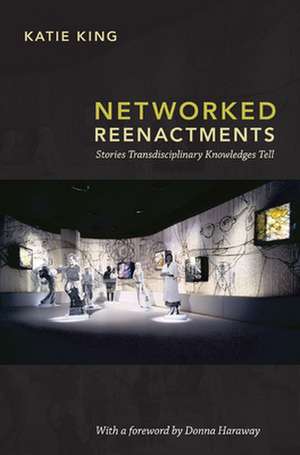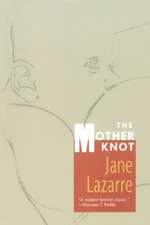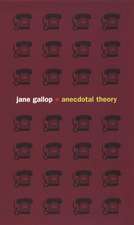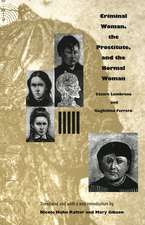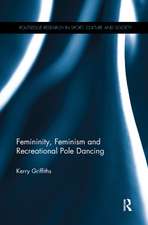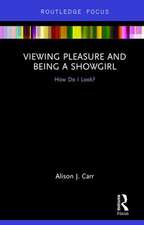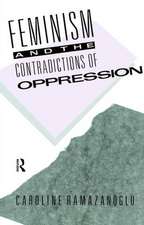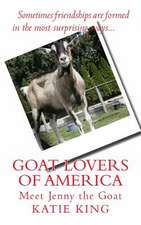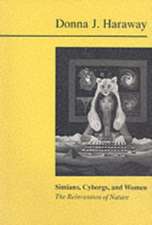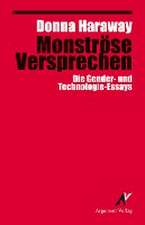Networked Reenactments – Stories Transdisciplinary Knowledges Tell
Autor Katie King, Donna J. Harawayen Limba Engleză Paperback – 4 ian 2012
Preț: 304.10 lei
Nou
Puncte Express: 456
Preț estimativ în valută:
58.20€ • 63.19$ • 48.88£
58.20€ • 63.19$ • 48.88£
Carte tipărită la comandă
Livrare economică 23 aprilie-07 mai
Preluare comenzi: 021 569.72.76
Specificații
ISBN-13: 9780822350729
ISBN-10: 0822350726
Pagini: 392
Ilustrații: 19 illustrations
Dimensiuni: 177 x 233 x 23 mm
Greutate: 0.57 kg
Editura: MD – Duke University Press
ISBN-10: 0822350726
Pagini: 392
Ilustrații: 19 illustrations
Dimensiuni: 177 x 233 x 23 mm
Greutate: 0.57 kg
Editura: MD – Duke University Press
Recenzii
Networked Reenactments is an extraordinary book that explores how to inhabit with seriousness and pleasure the many discomforts that we experience when trying to do work that matters to us and maybe to others. . . . Because any serious person is obliged to traverse knowledge worlds in terms not of our own making, King shows her readers how to befriend transdisciplinary movements with all of our vulnerability and power, capacity and incapacity, hope and worry. It is all about learning to play, or, as King writes, learning to be affected. Donna Haraway, from the foreword In this lively, thoughtful, and provocative book, Katie King traces the multiple layers and complex intertwined communities of practice that assemble around such diverse discursive sites as television programs, academic classes and conferences, museum exhibitions, and other public spectacles. Networked Reenactments leaves the reader with a heightened sense of the possibilities, as well as the limits and dangers, of contemporary knowledge production, of the ways that we collectively make meanings and understand the heritage of the past in the present. Steven Shaviro, author of Connected, or What It Means to Live in the Network Society
Notă biografică
Cuprins
Foreword / Donna Haraway ix
Preface. What Are Reenactments in This Book? xv
Acknowledgments xix
Introduction. A Thick Description amid Authorships, Audiences, and Agencies in the Nineties 1
1. Nationalities, Sexualities, and Global TV: Highlander, Xena, and Meanings of European Union 21
2. Science in American Life: Among the Culture Warriors 59
3. TV and the Web Come Together 129
4. Scholars and Intellectual Entrepreneurs 203
Conclusion. Toward a Feminist Transdisciplinary Posthumanities 273
Notes 301
Bibliography 335
Index 351
Preface. What Are Reenactments in This Book? xv
Acknowledgments xix
Introduction. A Thick Description amid Authorships, Audiences, and Agencies in the Nineties 1
1. Nationalities, Sexualities, and Global TV: Highlander, Xena, and Meanings of European Union 21
2. Science in American Life: Among the Culture Warriors 59
3. TV and the Web Come Together 129
4. Scholars and Intellectual Entrepreneurs 203
Conclusion. Toward a Feminist Transdisciplinary Posthumanities 273
Notes 301
Bibliography 335
Index 351
Descriere
In this feminist cultural study of reenactments, Katie King traces the development of a new kind of transmedia storytelling during the 1990s, as a response to the increasing difficulty of reaching large audiences at a time where entertainment media and knowledge production were both being restructured. King ties this development to political and economic changes that have come with globalization and the affordances that have come from new media. In a series of chapters addressing specific formsfrom television shows through museum exhibits to new media games and representationshe follows the shape of reenactments as they offer increasing affective and imaginative possibilities.
